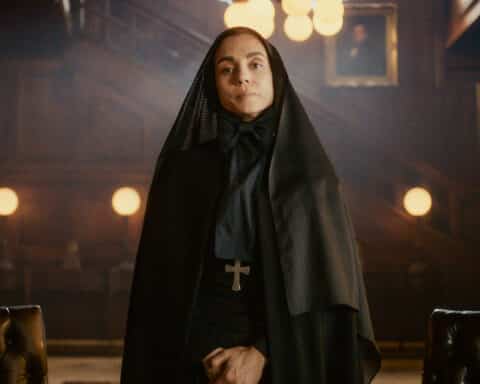One of my holiday rituals is to rewatch my favorite movie, “The Godfather.” While the film is not an exact fit in the holiday genre, a pivotal early scene occurs just before Christmas, and Christmas motifs and decorations occur throughout. Aside from debates about whether it’s really a Christmas movie (about which I will easily concede), “The Godfather” still contains surprising lessons that are consistent with Christian theology and witness. Among those is the persistent message that justice is both a limiting virtue and one rooted in a proper understanding of friendship.
In the famous opening scene of the film, an undertaker named Amerigo Bonasera asks Don Vito Corleone for a favor on the wedding day of the Don’s daughter. (Note: The film never mentions Bonasera’s first name; we know it is Amerigo from the Mario Puzo novel from which the film is adapted. I have written about the significance of that here.) Bonasera’s daughter had been severely beaten and permanently disfigured when she resisted the sexual advances of her assailants. After the men who beat his daughter received a suspended three-year sentence for their vicious crimes, Bonasera told his wife, “for justice, we must go to Don Corleone.” Thus, Bonasera whispered to the Don that he wanted him to have the men killed. “That I cannot do,” replied Corleone. But “I ask you for justice,” remonstrated the undertaker. “That is not justice,” insisted the Don, “your daughter is still alive.” “Then they can suffer,” Bonasera conceded, as his daughter suffered. To this, the Don consented.
In the real world, of course, we cannot endorse the lawlessness of Don Corleone’s agreement to have the young girl’s attackers beaten. But within that closed fictional world, we can glean an important lesson about justice as a limit against vengeance. Among the purposes of restraining the freedom or taking the property of those who injure others is to protect the common good. There are other effects of what we commonly call “punishment” (including deterrence and restitution). But from the perspective of the political community, to impose sanctions against the wrongdoer beyond what is necessary to protect the common good exceeds the bounds of justice. As a practical application, while the source is surprising, Don Corleone’s refusal to have the men killed helps us to understand the Catechism’s instruction that capital punishment is inadmissible when certain contingencies are met.
Section 2267 of the Catechism implies, in part, that punishment must be limited to the least amount of restraint consistent with the protection of the community. If, for example, it is possible permanently to restrain a person from committing a subsequent heinous crime without putting him to death, then it is mandatory that we do not put him to death. To exceed the minimum restraint is to go beyond the virtue of justice to the vice of vengeance. “Safeguarding the common good” becomes an act of retribution. This, the Catechism explains, is “inadmissible.”
Moreover, this vision of justice, “The Godfather” helps us understand, is rooted in friendship. Don Corleone complained to Bonasera that, before this request, he had never requested the Don’s friendship. Only after Bonasera made a sincere gesture of friendship did the Don agree to carry out this act of justice on behalf of his daughter. Justice is a virtue whose very definition involves reference to at least one other person. It is rendering to another what the other is due. Every act of justice involves some interaction with (or for the benefit of) another person. And, needless to say, friendship is the name we give to certain relationships between two or more persons. When Bonasera became Corleone’s friend, the Don considered his act of justice (again suspending real world standards) rooted in the newly established friendship. To render his friend his due was an act of justice; to refuse would have been an act of injustice.
This notion of justice and friendship appears in other places in the film. For example, in another crucial scene, Don Corleone’s son, Santino, is gunned down in an ambush. The killing was ordered by the head of another mafia family, Don Tattaglia, in response to Santino’s murder of Don Tattaglia’s son, Bruno. When Don Corleone learns of the death, he calls for a meeting of the mafia families (telling his consiglieri, Tom Hagen, “I want no acts of vengeance”).
In the subsequent meeting, the heads of the mob families negotiate the internal regulation of their various lines of crime. At one point, Don Barzini rehearses Don Corleone’s inventory of judges and politicians in New York, and complains that he must be willing to share them with the other families. “It’s not like the old days,” says Barzini, “when we can do anything we want. A refusal is not the act of a friend.” If Don Corleone truly wants friendship with the other families, “he must share” the judges and politicians, “or let others use them.” Anything else would be a betrayal of friendship and, thus, an injustice.
In the fictional world of “The Godfather” we can find glimmers of truth about the limits of justice and the virtue of friendship that can be applied in the real world of moral action. These glimpses of moral truth are often found in surprising places. And while the medium in this case is not to everyone’s liking, the lessons are salutary, nonetheless. Justice is rooted in friendship and a limitation against vengeance. Even Don Corleone got that right.
Kenneth Craycraft, an OSV columnist, is an associate professor of moral theology at Mount St. Mary’s Seminary and School of Theology in Cincinnati. Follow him on Twitter @krcraycraft.





